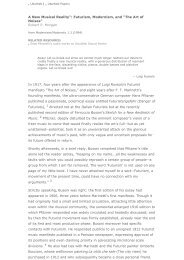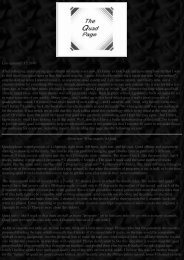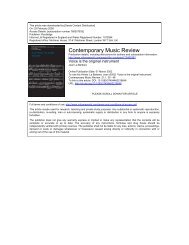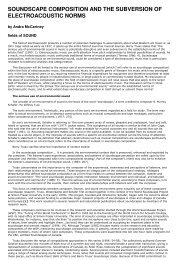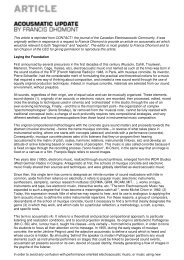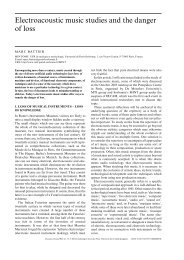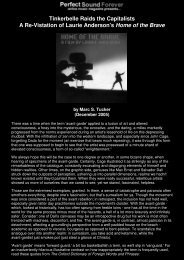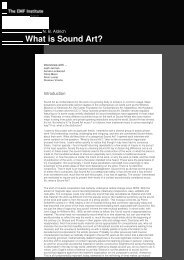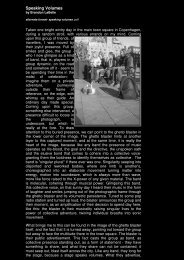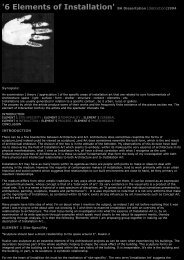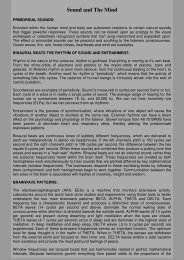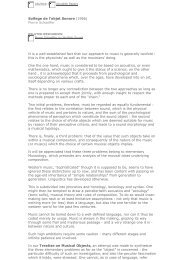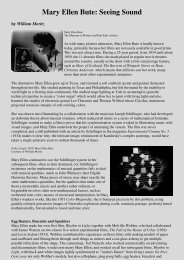Dunn-2008-Acoustic Ecology and the Experimental Music Tradition ...
Dunn-2008-Acoustic Ecology and the Experimental Music Tradition ...
Dunn-2008-Acoustic Ecology and the Experimental Music Tradition ...
- No tags were found...
You also want an ePaper? Increase the reach of your titles
YUMPU automatically turns print PDFs into web optimized ePapers that Google loves.
2.3.The framing of <strong>the</strong> concept of "<strong>the</strong> soundscape" as a defining metaphor forperceptually pulling forth <strong>the</strong> auditory characteristics of an environment intoforeground attention <strong>and</strong> insisting that <strong>the</strong>se sonic attributes be regarded as aconsistent organizing factor—not only for how <strong>the</strong> environment is defined <strong>and</strong>experienced, but as an essential feature for defining <strong>the</strong> historical <strong>and</strong> ongoingsocial relationship of humans to that environment.The necessity to heighten awareness of <strong>the</strong> negative consequences of certainhistorical developments in human societies that have resulted in <strong>the</strong> loss oftraditional knowledge conveyed through sound or, similarly, <strong>the</strong> increase ofindustrial "noise" that has both a disintegrating social impact <strong>and</strong>psycho-physiological destructive aspect. This concern has often been simplifiedinto issues of "noise pollution" <strong>and</strong> confounded with <strong>the</strong> more direct agenda ofenvironmental acoustics.The evolution of Schafer's ideas can be traced through his sequence of extraordinarywritings, starting with many of <strong>the</strong> general concepts, moving through curriculumoutlines <strong>and</strong> listening exercises, <strong>and</strong> eventually to <strong>the</strong> defining of a lexicon of formallanguage for framing all of <strong>the</strong>se ideas towards heuristic application <strong>and</strong> research.During <strong>the</strong> expansion of <strong>the</strong>se concepts, <strong>the</strong>re formed a larger collective of colleaguesthat became known as <strong>the</strong> World Soundscape Project. Books <strong>and</strong> recordings werepublished that demonstrated many of <strong>the</strong> group's core concerns <strong>and</strong> a st<strong>and</strong>ardarsenal of tools <strong>and</strong> strategies for increasing listening sensitivity to <strong>the</strong> environmentwere codified: soundscape recording, list making, oral history recording, various formsof sound mapping, amplitude <strong>and</strong> spectral charting of auditory spatial locations, soundwalks, <strong>and</strong> many o<strong>the</strong>r types of listening exercises that were especially geared foreducational uses with children. Overall <strong>the</strong> group produced a combination of activitiesdrawn from both <strong>the</strong> emphasis on experiential education that was burgeoning at <strong>the</strong>time <strong>and</strong> a form of quantifiable communication <strong>the</strong>ory that is more characteristic of<strong>the</strong> social sciences than of musicology. Diaries <strong>and</strong> field observations of specificgeographic locations (Vancouver <strong>and</strong> several European villages) resemblingethnographic field notes were made <strong>and</strong> data collected to subsequently createingenious charts <strong>and</strong> maps showing correlations between sonic l<strong>and</strong>marks <strong>and</strong>patterns of social organization <strong>and</strong> history.While <strong>the</strong> principal metaphor that Schafer used to formulate his concept of <strong>Acoustic</strong><strong>Ecology</strong> <strong>and</strong> <strong>the</strong> World Soundscape Project was <strong>the</strong> value of listening to <strong>the</strong>soundscape as if it were a musical composition—<strong>and</strong> even participating in how thatsoundscape gets "composed"—<strong>the</strong>re also seemed to be a dramatic schism betweenhis interests as a composer <strong>and</strong> <strong>the</strong> maintenance of <strong>the</strong> WSP as a somewhatabstract—<strong>and</strong> didactic—research project. The two always seemed separate in his mind<strong>and</strong> creative output. <strong>Acoustic</strong> <strong>Ecology</strong> may have been inspired by music but neverbecame music <strong>and</strong>, conversely, some of his music may have been influenced by<strong>Acoustic</strong> <strong>Ecology</strong> but never became "<strong>Acoustic</strong> <strong>Ecology</strong>" except in <strong>the</strong> mostrudimentary <strong>and</strong> academic of cases.In recent years this has somewhat shifted. As composer Warren Burt has remindedme, Schafer has been staging a series of ritualistic operas in <strong>the</strong> remote Canadianwilderness called Patria. Warren has made <strong>the</strong> excellent point that <strong>the</strong>se eventsrequire a real commitment on <strong>the</strong> part of <strong>the</strong> audience—sometimes several days ofhiking to, <strong>and</strong> living in, <strong>the</strong> performance locale—<strong>and</strong> <strong>the</strong>refore represent a seriousattempt at a renewal of <strong>the</strong> social function of music, one that moves much closer toreconciling Schafer's earlier music <strong>and</strong> his <strong>Acoustic</strong> <strong>Ecology</strong> concerns.In many ways <strong>the</strong> current expansion of <strong>the</strong> term <strong>Acoustic</strong> <strong>Ecology</strong>—which o<strong>the</strong>rwiseseems historically appropriate—is reinforced by a largely conservative musicalestablishment—especially in academia—interested in placing experimental musicalactivity into a zone of non-musical status. The term provides for a convenientoutlying conceptual domain where much sound-based art that o<strong>the</strong>rwise isthreatening to traditional musical values can, from that perspective, be exiled withoutuncomfortable argument. This can also be said about <strong>the</strong> split that has taken placebetween "concert music" <strong>and</strong> "sound art," where <strong>the</strong> latter has often been a forcedcategorization for certain kinds of experimental practice that aes<strong>the</strong>tically conflict withmore conservative musical assumptions: if it doesn't conform to certainpreconceptions about music, <strong>the</strong>n call it something else so those assumptions won'tbe seriously challenged.As a composer, Schafer has essentially been a Romantic Modernist (by no meansmeant as a pejorative) here defined as an interest in exp<strong>and</strong>ing <strong>the</strong> expressivepalette of music while maintaining an essentially 19th-century aes<strong>the</strong>tic concept of



